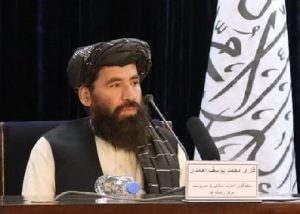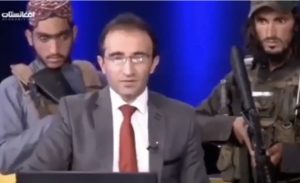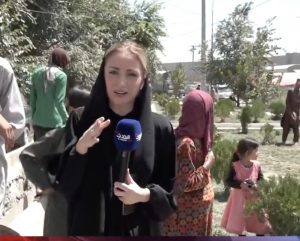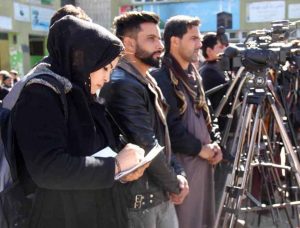London – While in the first days after the capture of Kabul, on August 15, 2021, the Taliban command signaled that journalists and media would be respected in Afghanistan, this was not the case in the country experiencing an economic and freedom crisis. .
From then on, the script was one of persecution, threats and official restrictions on the free press and the work of women journalists. According to Reporters Without Borders (RSF), three professionals have been imprisoned and at least 80 people detained in the past 12 months.
Along with this came a serious economic crisis, which contributed to the shutdown of a significant part of the country’s media outlets, including those that did not come under direct pressure.
The extent of the press crisis in Afghanistan
An RSF report counted that Afghanistan had 547 outlets before August 15, 2021. A year later, 219 outlets were closed.
And out of 11,857 journalists counted before the Taliban took back control of the country, there are currently only 4,759 journalists in the profession.
The organization’s research revealed that the obligation to replace music or news programs with religious content in some provinces caused some media outlets to stop broadcasting.
But new economic constraints, such as the end of international or national funding and the decline in advertising revenues as a result of the economic crisis, are also causing some media outlets to shut down, RSF says.
According to the United Nations Development Programme, Afghanistan has lost 700,000 jobs, with the proportion of Afghans below the poverty line expected to reach 97% this year.
According to a report by Afghan television network ToloNews, local media officials in Uruzgan gathered two weeks ago to ask for help to prevent a complete meltdown of media in the state.
Baryalai Mangal, head of Salam Uruzgan radio, said that in the past only five of 25 employees remained and four were unpaid. Only the technician is paid.
“We can’t pay enough for the eight employees who work with us. “We cannot give them money that meets their needs or pays for their families,” said Shah Mahmood Hamdard, head of Paiwastoon TV.
The network was created in February 2021 before the rise of the Taliban. Hamdard was one of those who requested financial assistance from the Taliban to keep the local media active.
But the answer was not very encouraging. “Afghanistan is facing an economic crisis, this is the biggest reason,” Ghulam Nabi Ulfat, head of the Information and Culture department in Uruzgan, told ToloNews.
These factors add to the impact of brutal regulations and the failure to comply with Afghanistan’s own press freedom law, enacted in 2015, which a government spokesperson says is still in effect.
But in practice this does not happen.
Decrees and regulations exacerbate media crisis
When the Taliban came to power, the RSF offered to sign a pledge that the press would be respected and able to work freely, but the country’s new leaders refused to sign it, plunging Afghan journalism into a crisis that showed no signs of composure.
Since then, there have been successive official restrictions on the content and work of women journalists.
The latest order was a decree issued on July 22 by Mullah Haybatullah Akhundzade, the supreme leader of the Taliban, to silence criticism of government officials.
In the regulation, “slandering and criticizing state officials without evidence” and “spreading false news and rumors” are prohibited by Islam.
And he informs government officials that “slanderers” are unwittingly collaborating with the government. he is the enemy and will be “punished”.
Reporters Without Borders criticized, “This statement by the highest official of the Islamic Emirate is a manifestation of his determination to suppress press freedom in Afghanistan.”
Other regulations enacted by various Taliban bodies to define rules governing freedom of the press already restricted journalistic activities.
The “11 Journalism Rule” announced by the Government Media and Information Center (GMIC) on September 19, 2021 had already paved the way for censorship and persecution of journalists.
Also Read | Taliban announce media rules in Afghanistan, ban anti-Islamic stories
They use vague wording and point out that “issues that may adversely affect public attitudes or affect morale should be handled with care in publishing or publishing.”
And it mandates that the media “make detailed reports in coordination with GMIC”.
People with potential to criticize the government are not interviewed or invited on TV shows, a decree issued on 22 November by the Ministry for the Promotion of Virtue and the Suppression of Evil, which is responsible for ensuring that sharia law is respected in the public sphere and enforcing the Qur’anic teaching of “commanding good and forbidding evil.”
Another decree by the Ministry of Information and Culture on 28 March banned private TV channels from rebroadcasting news programs in local languages by international broadcasters BBC, Voice of America and Deutsche Welle.
Reporters Without Borders said, “All these decrees violate the media law enacted in March 2015.
When questioned by the RSF in February, the organization claims that Zabihullah Mujahid, government spokesman and deputy minister of information and culture, assured him that this press law was still in effect.
Also Read | Taliban, one year: see the facts that destroy press freedom in Afghanistan
Taliban, Abuses and Arbitrary Arrests in Afghanistan
These regulations led to increased media censorship and self-censorship, and arbitrary arrests of journalists.
According to the RSF, since 15 August 2021 at least 80 journalists have been detained for varying periods of time, some of them violent, by security forces, especially Intelligence (intelligence services), which was involved in most arbitrary arrests of journalists. – Since the beginning of 2022.
Three journalists are currently in prison in Afghanistan on the grounds that they “endanger the security of the country”.
Only one person was convicted, Khalid Qaderi, a poet and journalist for Herat-based Radio Norroz. On May 7, 2022, he received a one-year prison sentence from the military court.
The other two, Mirza Hassani, owner of Radio Aftab in Daikundi Province, who was arrested on May 22, 2022, and Abdul Hanan Mohammadi, reporter of the Kapisa-based news agency Pajhwok, were arrested on June 12, 2022.
Both are awaiting trial.
As of August 15, 2021, RSF also recorded at least 30 cases of journalists directly subjected to violence by security forces during their work.
Leaders of the new journalist organizations formed under the Taliban, which are part of the new Afghanistan Journalists and Media Federation, stressed the progress they have made in their negotiations with the government.
Some think the situation in Afghanistan has improved
Leaders of the new journalist organizations formed under the Taliban, which are part of the new Afghanistan Federation of Journalists and Media, highlighted to RSF the progress they have made in their negotiations with the government.
Hafizullah Barakzai, Chairman of the Afghanistan Journalists’ Assembly, defined the economy as the most important problem and said, “Despite the increasing threats in the first months after August 15, the number of cases of violence has decreased compared to recent years.”
Afghan Media Organization head Abozar Sarem Sarepole said the number of journalists arbitrarily detained varies according to the press freedom organization that counts them, because “some did not specify the reason for their arrest” and “some journalists were detained”. He was not arrested for his journalistic activities.”
Both Barakzai and Sarepole said they believe the reinstatement of the Media Crimes Verification Commission, which they hope will happen soon, could prevent arbitrary arrests and government interference in media matters.
This commission, which is one of the provisions of the 2015 press law, aims to handle complaints against journalists and media outlets.
Reporters Without Borders explains that under the 2015 law, complaints should only be referred to court if the commission decides.
Also Read | In the live broadcast, the reporter is prevented from watching the UN donation by the armed Taliban; to watch
The economic crisis worsens the situation in Afghanistan
This optimistic view of the commission is not shared by Zia Bumia, a former Afghanistan Journalists and Media Federation member.
He told RSF that the commission would not be able to play its role properly, especially as it would not include representatives of the independent human rights commission that the Taliban had suspended.
A Kabul journalist working for a national media outlet admitted to the press freedom NGO, on condition of anonymity, that “recognition of the 2015 press law is an important step for journalists in Afghanistan”.
However, he said that would not be enough as the situation had deteriorated so much.
“Half of the journalists have left the country, most of the media outlets still in operation are in a dire economic situation and are likely to go bankrupt, the pressure on the media and official censorship is stifling and the situation is even worse. more in the provinces than in Kabul,” he said.
“More than a law, we need the will to help the media and respect press freedom at the highest level of government above the Ministry of Information and Culture.”
In 2012, Afghanistan was ranked 150th out of 179 countries in RSF’s Press Freedom Index. It has risen to 122nd place out of 180 countries by 2021, thanks to the dynamic media landscape and the adoption of laws protecting journalists.
And it dropped to 156th place in 2022 after losing about 40% of its media and more than half of its journalists.
Also Read | In one Taliban year, there are only 656 female journalists in Afghanistan; they report ‘massacre’
source: Noticias
[author_name]



